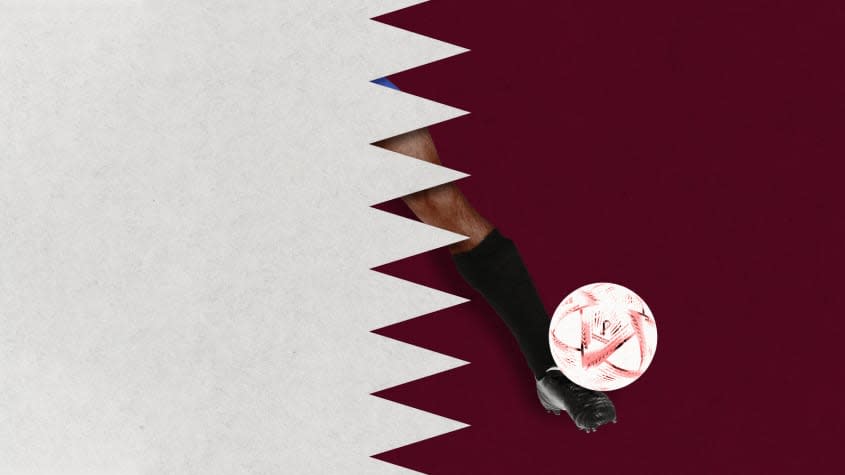The World Cup controversies, explained

Soccer's biggest spectacle, the World Cup, is finally here — but not without controversy.
The tournament starts Sunday in Qatar, an oil-rich nation where "laws against gay sex and treatment of LGBTQ people are flashpoints" as the World Cup approaches, The Associated Press reports: Qatar is one of 11 countries where homosexuality is potentially punishable by death. Concerns flared anew after Qatar's FIFA World Cup ambassador, Khalid Salman, described homosexuality as "damage in the mind" in a pre-tournament interview. While Qatar says that all fans are welcome, The Guardian notes, "tournament organizers have warned against public displays of affection."
Some participants are pushing back: The U.S. team is prominently displaying a rainbow-themed team logo inside its training facility and media workroom in Qatar, for example. But despite the protests and controversies, the World Cup will carry on. Why is Qatar hosting the World Cup in the first place, and how might the tournament be shaped by off-the-pitch debates? Here's everything you need to know:
How did Qatar get the World Cup?
Even this question is a source of consternation. "Suspicion and rumors" followed a 2010 vote by soccer's organizing body, FIFA, to award the 2018 World Cup to Russia and the 2022 tournament to Qatar, Reuters reports. Indeed, U.S. authorities in 2021 brought indictments alleging that Russian and Qatari officials had bribed FIFA voters to support their bids. "Three South American officials, according to the indictment, received payments to vote for Qatar," The New York Times reports. As a result, Qatar beat out the U.S. for this year's hosting rights. FIFA's longtime chief, Sepp Blatter, resigned five years later in the face of a corruption scandal.
Why is Qatar hosting the World Cup?
There have been some suggestions of "sportswashing," a term for when a company or country spends lavishly on sporting events in order to bolster or launder its reputation. (Another notable example: Saudi Arabia's support for LIV Golf, the league challenging the PGA for top players.) "Outside of its region, Qatar's cultural relevance was essentially nonexistent compared with other countries in the Middle East," ESPN reports. Qatar — the first Muslim or Arab country to host the World Cup — might be in particular need of a reputational lift. It doesn't just face criticism for its LGBTQ policies: Migrant workers and women in the country also complain of poor treatment. It's unclear whether the World Cup can obscure those issues. Instead, ESPN notes, the international focus might have the effect of "intensifying the spotlight" on the country's problems.
How are the controversies playing out?
The United States isn't the only nation making a statement. Captains of European teams have said they'll wear rainbow armbands during the matches, although there might be exceptions. Rod Stewart, meanwhile, says he turned down a million-dollar paycheck to perform during the tournament. "It's not right to go," he told the Sunday Times. All of this has cast a pall on soccer's greatest celebration of itself. "The controversies surrounding the regime there take some of that excitement away," longtime BBC sports journalist Gabby Logan writes, "and make me feel uncomfortable about the whole occasion."
But the World Cup will still draw a lot of soccer fans — and more than a few leaders of governments around the world. U.S. Secretary of State Anthony Blinken will attend, Politico reports, adding that Qatar is a "key strategic ally for the West on energy security." U.K. Foreign Secretary James Cleverly will also be there and has discouraged protests by his countrymen. "When British nationals travel overseas they should respect the laws of their host country," he said.
What else is different about the Qatar World Cup?
It's being held in November and December, which is a pretty big departure from the tournament's usual spring and summer schedule. Why? It's way too hot during the Qatari summer to safely play outdoor soccer. The Sporting News points out that the average high temperature in Qatar's Doha region is 70 degrees Fahrenheit during December — and 92 degrees in May. That means European professional soccer teams are taking an "unusual midseason break" so their players can participate, CBS Sports reports.
Fans will also see some changes. Beer vendors are usually prominent in the stadiums; this time they'll be somewhat hidden out of concerns that the free flow of alcohol "would unsettle the local population and thus represent a potential security problem," The New York Times reports. Alcohol is usually "tightly controlled" in the country.
What about the soccer games?
Oh, right. That's what this is all about, isn't it? Reuters reports that Brazil — the winningest nation in World Cup history — is favored to win the tournament with 4-to-1 odds and that England's Harry Kane is expected to be the top goal scorer. As for the United States, the team is expected to survive early round-robin play "but oddsmakers don't expect them to go much further," NBC Sports reports.
The World Cup starts Sunday with a match between Qatar and Ecuador. The final will be on Dec. 18 at Lusail Iconic Stadium.
You may also like
Ivanka Trump skips her father's 2024 campaign launch despite reported pleading from Trump
Jeopardy! champion Amy Schneider testifies in Ohio against 'dangerous' trans bill
Russia has spent a 'substantial portion' of its advanced missiles to destroy Ukraine's energy grid

